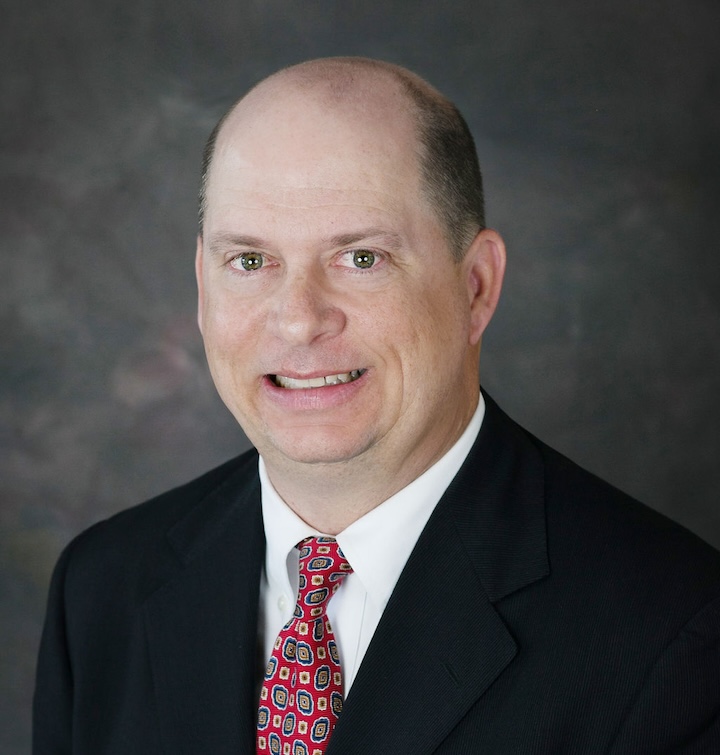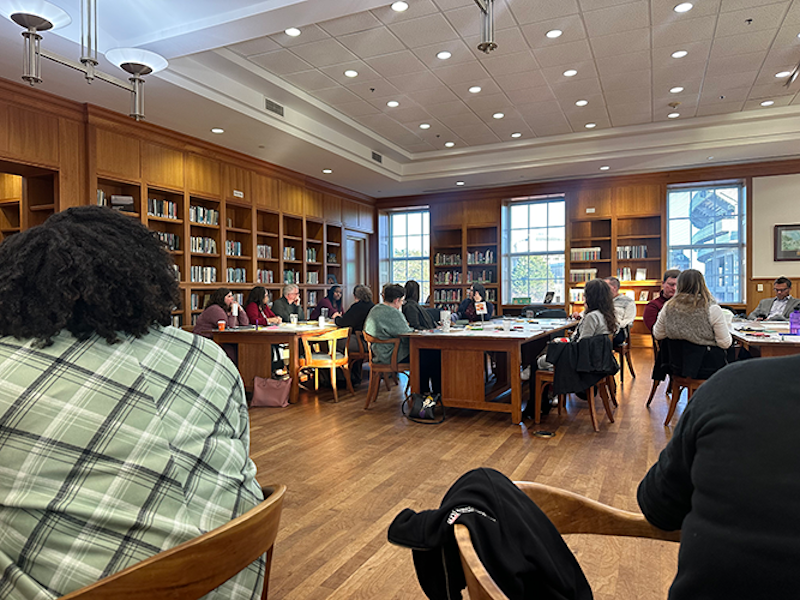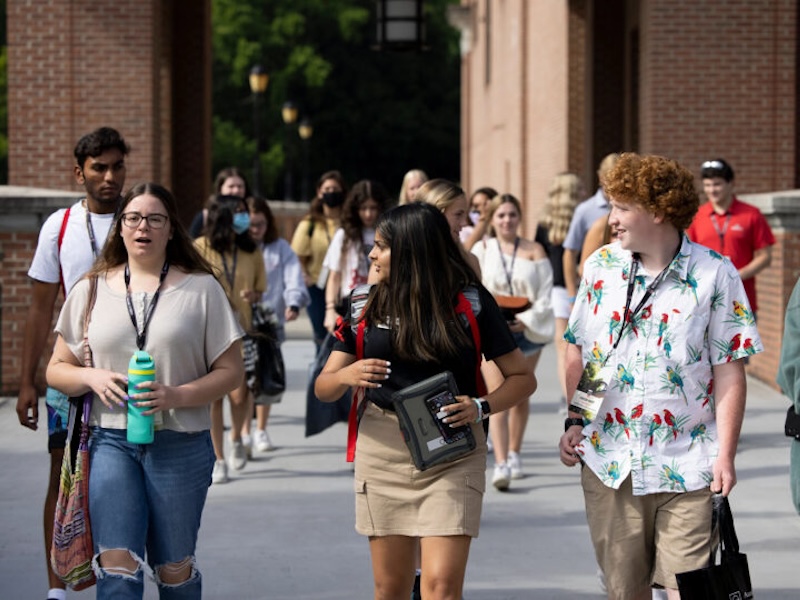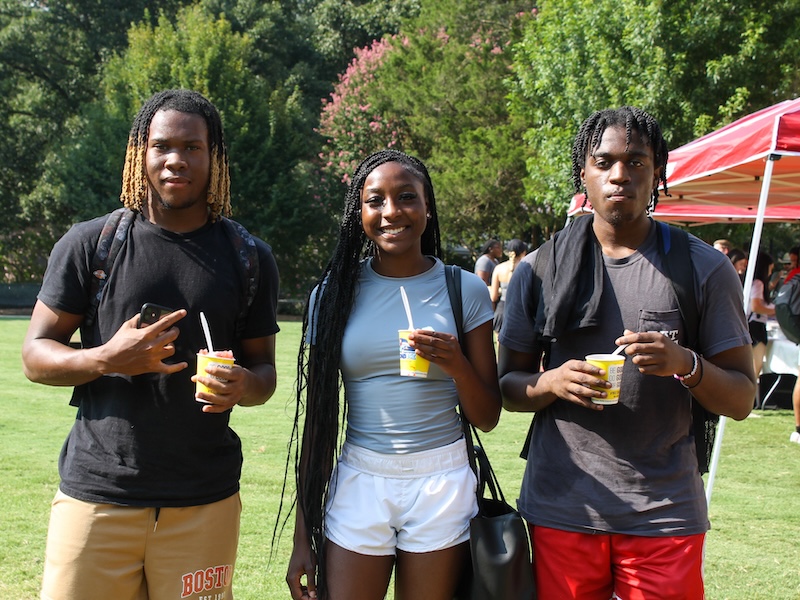Dr. Garrison Bickerstaff
Senior Lecturer

Garrison Bickerstaff completed a PhD in Linguistics at UGA in 2010. He teaches several courses for DAE, including UNIV 1105: Introducing English Composition and UNIV 2111: Developing Literacies in the Humanities. He also coordinates UNIV 2115: Digital Literacies and Documentary Media.
His UNIV 1201S: Learning for Success at the University course in the Thrive at Georgia summer experience partners annually with the Friends of the Oconee Hill Cemetery for service-learning activities.
Education
- Ph.D in Linguistics — University of Georgia
- M.A. in English — Tennessee Technological University
- B.A. English — Tennessee Technological University
Awards & Honors
- UGA Center for Teaching and Learning Writing Fellow (2011-2012)
- UGA Writing Retreat for Writing Fellows Participant (2013)
- Sustainability across the Curriculum Faculty Development Workshop Participant (2014)
- UGA Special Collections Libraries Faculty Fellow (2016)
- Division of Academic Enhancement Innovation in Teaching Award (2016)
Areas of Expertise
Dr. Bickerstaff’s pedagogical interests include undergraduate writing, graduate writing, undergraduate experience (including first-year experience), and undergraduate success.
Teaching Philosophy
I have learned that a successful teacher must constantly learn, and that learning process often comes from reactions to insights that students present. I cultivate a classroom atmosphere in which students are not only encouraged to share their ideas but also reassured that their ideas will be respected in the classroom. I also feel that the classroom includes interaction outside of the classroom in the settings of office visits, on-site library research, and on-site service learning. My motivating students to understand, recognize, and employ a critical thought process is central to my teaching of writing and all other courses.
I connect with students through determining their strengths and building on those strengths. I also try to detect areas in which they are seeking to grow academically but need support to make the necessary connections in order to realize that growth. As a result of my course, students will be able to critically analyze research before they complete the course, and they will also be able to critically examine themselves and their own learning strategies and other personal metacognitive practices. I often observe such progress when a student independently identifies the difference between summary of a text and analysis of a text and attributes that discernment to a writing strategy that was acquired in my course. Such a critical thought process is valuable to students’ success here at the academy and beyond in the professional workplace.
Students frequently express that a required course that is outside of their major area might not be useful to their professional careers. I stress the importance of the critical processes that are often needed for success in that course and how the mastery of those processes can be applied in a variety of professional careers. For example, a student in a second-year history course may need to prepare for an essay examination. Such successful preparation could include prediction of essay questions, out-of-class essay writing, and office visits with the professor to seek feedback on the predicted questions and on the prepared essays. This process motivates the student to critically evaluate the self (through the planning and maintaining of study time and self-imposed deadlines) and a variety of streams of course material, including a textbook (or other text), lecture notes, and the student’s critical response to these materials. As a result of my course, students will understand not only how to implement these strategies but also that these relevant critical thought processes and strategies for success at the academy translate directly to successful practices in the professional workplace.
I encourage collaboration in the classroom in which students work in groups in order to solve problems and learn from their peers. I have seen students progress significantly when they pursue on-site library archival research. Each group of students shares the task of pursuing research on a single concept (generally a well-known figure in the history of the university or state) but must make decisions at the individual and group levels about inclusion and exclusion of material based on requirements of the assignment. I guide these student work groups and look for areas in which they may be struggling to meet the goals of the assignment. I also explain the significance of research discoveries and contributions to the project that they make as individuals and as groups. At the conclusion of a service learning project in my course, students will be able to meet deadlines, make decisions about how well a source meets the requirements of the assignment, and appreciate how their contributions and those of their peers make the project a success. These critical thought processes about the self, peers, and archival materials contribute to success at the academy and in the personal and professional phases of students’ lives.
I encourage my students to develop a love for their university. I stress the cultivation of this affection through helping them to become more acquainted with opportunities on campus, the libraries, and other useful resources on campus. My ability to become involved in students’ critical thought processes in the examination of themselves, their peers, and the texts that they face at the academy has been the most significant academic contribution that I have made to the lives of my students. My students often comment that they earned a certain score on an examination and provide further explanation as to why. When they do so, I recognize the critical thought processes that they are applying toward success at the academy and how those critical thought processes will remain with them in the future.
Inclusive Teaching Statement
I support the mission of the Division of Academic Enhancement, which “empowers all students to Learn Differently through innovative courses, programs, services, and student-centered initiatives” (“About Us”). I support innovation in my instruction (including my tutoring), and such growth is only possible through listening carefully to students.
I am committed to diversity and inclusion in my classes. I welcome students from underrepresented groups and have seen great contributions in my classes from international students, first generation students, students of color, and students who sometimes lack the confidence to participate right away. These students and all students are welcomed and respected in my classes. I encourage all of my students to contribute to discussions and follow up with comments to me by e-mail if they wish. Their contributions motivate me to reflect on my own pedagogy and also to innovate in order to create a challenging and useful classroom community.




